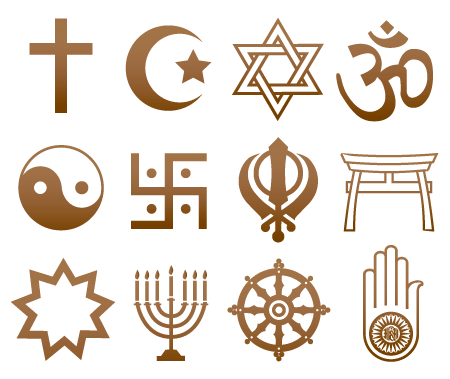So... what exactly do Muslims believe? A series! Part 2: Belief in Allah & Monotheism
Quick Recap and Introduction
Real life Muslim here again! Last time, we introduced the idea of the six articles of faith, which provide the core essence of Muslim theology. We spoke about the problem in finding out what God is, when, by His nature, he is transcendent and far beyond anything our minds can relate to. We looked into the 99 names of Allah, which present to us a picture of what Muslims think God is. This time around, we're going to be diving into the concept of Tawheed which roughly translates to Monotheism, and why Muslims understand worshipping God alone to be the single most important aspect of faith. I had originally wanted to talk about the antithesis of this idea, shirk, which roughly translates as polytheism, but that'l have to wait until the next post!
What is Monotheism?
"La ilaha illallah; there is none worthy of worship but Allah!" - The first words of the Islamic declaration of faith, which a person utters to enter the fold of Islam
We Occidental folk tend to understand monotheism to simply mean the belief in one god rather than several, as opposed to polytheism, which is belief in a multiplicity of divine powers, and henotheism, which is belief in multiple gods but exclusive worship towards one. Judaism, Christianity, and Islam are traditionally regarded as the three great monotheistic religions, though one can find the footsteps of monotheism all over the world; In pre-Columbian North America, the Iroquois and several other tribes believed in the existence of a single "Great Spirit" called the Ha-wen-ne-yu who communicated His desires to man through messengers known as the Ho-no-che-no-keh. Even in Hinduism, the quintessential polytheistic religion with an almost infinite amount of gods, there is an idea that behind all of these forms there is a divine oneness that sustains all of creation, the Brahman. Even the more explicitly polytheistic religions, such as the Greeks with their poetry-inspiring pantheon, had a place for a "God above all other gods" and even the pagan Arabs believed in Allah and used his name to refer to the highest divine being, despite their invention of gods beneath Him such as 'Uzza and al-Lat.

From an Islamic perspective, there is a single divine spark to all religious traditions, which has been diluted and distorted in the case of all faiths except for that of Islam.
Nevertheless, these echoes of monotheism do not quite reach the Islamic standard of Tawheed, or divine oneness. The Christians, sincere as they may be, ascribe to God a son and divide Him into three persons within a singular "Godhead." The Iroquois elevated the status of God's Messengers to the point where they supplicated to them in place of God. The Zoroastrians of Persia tried to separate good and evil by creating an anti-God, Angra Mainyu, but in doing so, blasphemed against God's omnipotence. To the Muslims, these understandings of God have all strayed from the path, and believe that the correct understanding of God lies in His oneness and freedom of need from any created beings, His eternal nature and lack of any familial limitations, and His unique/transcendent nature beyond anything known or understood by creation. The Qur'an speaks thus:
Say: He is Allah, One.
God, as-Samad
He neither begets nor is born
Nor is there to Him any equivalent
Categories of Tawheed
Muslim scholars have expounded upon the Qur'an and the sayings of Muhammad, peace be upon him, known as the hadith, and have come up with three categories of which Tawheed is comprised of. If any of these categories are compromised, a person's religion and belief in Allah is as well. The categories are as follows:
1. Tawheed ar-Rubbiyyah: The Unity of Lordship. God alone is the creator and controller of all things, and nothing happens or exists except that He allows it to happen. While Allah has granted human beings the agency to obey Him or disobey Him, nothing happens except that God has willed it. We'll go more in depth in regards to this idea when we talk about the 6th article of faith, Qadr, but for now just remember that Muslims believe there is no force independent of God.
2. Tawheed al-Asma' wal Sifaat: The Unity of God's Names and Attributes. God alone can be described with His names, and while we can call a human being merciful or just, we can not call them The Merciful or The Just, as these names are reserved for God alone. Likewise, to say that anything except for Allah is the Creator, or the Bringer of Death, is to deny God's Oneness and violate the principle of Tawheed.
3. Tawheed ul-Ibaadah: The Unity of God's Worship. Muslims worship God alone, and indeed, recite the verse "You alone do we worship, and you alone do we ask for help" (Qur'an 1:5) at least seventeen times a day during their normal, proscribed prayers. To show anybody or anything except for God the worship due to Him is the most heinous sin in Islam, as is praying to anybody except for Him for aid, as God alone is able to help mankind.
There is indeed a lot of overlap between these categories. For example, part of recognizing the unity of God's Lordship lies in accepting his unique claim to His Names and Attributes, and part of Tawheed ul-Ibaadah is to accept that God alone is al-Wali, the Helper, and As-Sami, the Hearer (of supplications). Behind each of these categories, however, is one single unifying principle: God is One; Allahu ahad. For the Muslims, anything that divides God or His authority goes against monotheism; for us, it is not enough to merely say "We believe in one God." The principle of "La ilaha illallah" is ingrained into every single aspect of Islamic theology, and Islam cannot be understood except through this lens of Tawheed, divine oneness.
Coming up next! False gods!

Yeah, lots of Stargate SG-1 jokes coming up next time. Can't help myself on that regard either.
Seriously though, to finish off this series of articles on the first article of faith, Belief in Allah, we need to talk about what negates it. This entails dealing with the most heinous of sins in the eyes of Muslims, shirk, or associating a partner with Allah. We'll look at different forms of idolatry throughout history and discuss the implications of these beliefs from a Muslim perspective. After that, we can finally get started on the second article of faith and answer the burning question a lot of people seem to have: "So, who exactly is this Muhammad (saw) guy?"
Peace to everybody! :) As usual, please keep questions relevant to the topics discussed in the post.